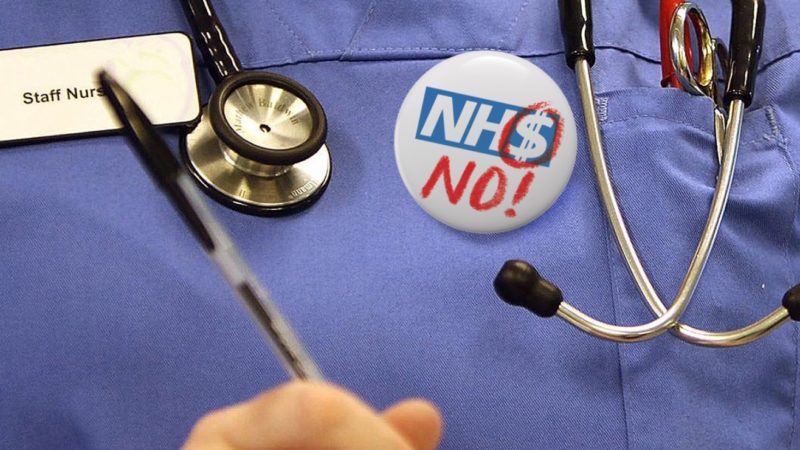The government is pushing a new consultation on how to turn NHS contracts into semi to fully private deals. Kane Shaw explains the dangers lurking behind ICPs.

NHS England is currently holding a consultation on the rollout of a new system of health and social care provision known as Integrated Care Provider (ICP) contracts.
Originally named Accountable Care Organisations (ACO), the government was forced into a rebranding exercise after the late Professor Stephen Hawking, and a team of academics, took them – and NHS England – to court.
Their judicial review claimed ACOs would illegally usurp the power of Clinical Commissioning Groups and pass this into the hands of the private sector.
The fact the name Accountable Care Organisations derives from the US healthcare system, where private companies are notorious for limiting patients’ access to care to save money, is also one reason for the rebranding exercise.
Unfortunately, the JR4NHS judicial review was unsuccessful, and now NHS activists 999 Call for the NHS are fighting a last-ditch battle through the Court of Appeal to halt their rollout.
But what are Integrated Care Providers? And why all the fuss?
ICPs would manage the provision of health and social care for entire regions of England – 44 to be exact – for 10-15 years per contract.
The ICP would be a single entity consisting of NHS bodies and private sector bodies. But, as the contract currently stands, nothing prevents ICPs, theoretically, from being composed entirely of corporate bodies.
There has been no vote in Parliament legislating for the implementation of ICPs. The government and NHS England have made it clear they don’t intend for a vote to take place either. This means that ICPs won’t be statutory bodies, and won’t be governed by the mechanisms currently in use to hold the NHS to account.
This also means they will not be subject to Freedom of Information requests; not be obliged to hold board meetings in public or make those minutes publicly available; able to deny the public access to information on the pretence of “commercial confidence” protections; and be exempt from judicial review.
The contract also states that ICPs only have a “duty to engage” with the public. This is far weaker than NHS bodies’ statutory obligations to consult. It also leaves us with a series of unanswered questions; such as what powers local authority scrutiny committees will have in holding an ICP to account.
We are also concerned Brexit will chain the NHS to the ICP contract permanently.
The UK’s economy accounts for 3.85% of the global economy, and the government wants the UK to strike bilateral trade deals with larger economies such as China and the US. The purchaser-provider split will be an enticing market for foreign investment and we believe – along with the British Medical Association – that real politik dictates the UK will lack the economic power to shelter that market from foreign investment.
Any free trade agreement which included the internal NHS market would be underpinned by an Investor State Dispute Settlement mechanism. This would seriously hamper the ability for future governments to renationalise the NHS.
In short, we believe the ICP contract undermines the public accountability of the NHS and that its implementation in the context of Brexit undermines future democratic decision making.
So why are the government implementing ICPs?
The government and NHS England claim ICPs will finally reintegrate social care with healthcare – and this is a laudable aim. NHS activists and those working within the health service would welcome integration between them. The problem is ICPs won’t integrate health and social care because they can’t.
Healthcare is provided by the NHS, is free at the point of use and funded through tax. Social care is mainly private provided, means tested and charged for. Integration between them requires legislation bringing social care back into the NHS.
The current consultation also ignores what the National Audit Office has repeatedly made clear: the biggest barrier to integrating the two services is funding.
But, despite the doom and gloom there are a number of things we can all do – irrespective of party affiliations – to ensure the NHS remains accountable to the public.
- You can begin by attending the rally for the NHS Reinstatement Bill outside Parliament and the Department of Health on the 26 October.
- You can also sign this petition which will be presented to the government calling for them to scrap the ICP contract.
- Alongside this you can respond to the NHS’ consultation. It is vital that NHS England knows people are aware of what is taking place.
- Finally, you can donate to 999 Call for the NHS’ judicial review on Crowd Justice.
Together we can fight for a better NHS for all.
Kane Shaw is a spokesperson for the National Health Action Party.
Left Foot Forward doesn't have the backing of big business or billionaires. We rely on the kind and generous support of ordinary people like you.
You can support hard-hitting journalism that holds the right to account, provides a forum for debate among progressives, and covers the stories the rest of the media ignore. Donate today.



